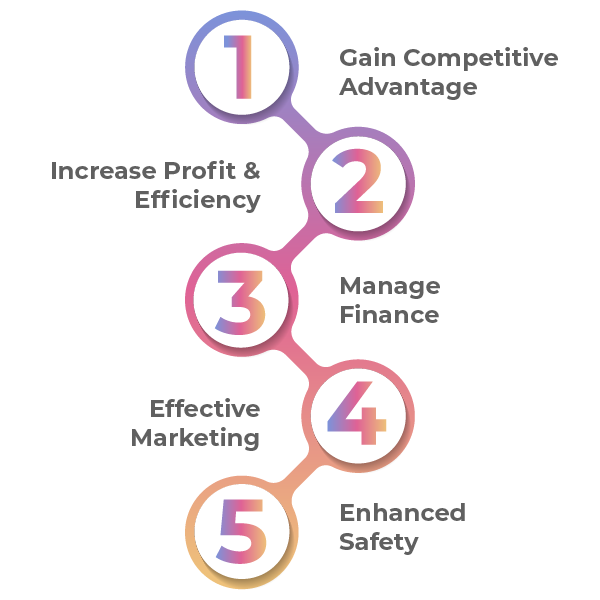To develop and grow a business in today’s competitive market, companies rely on data-driven decision-making to make the predictive analysis of business risks and sustain success. Efficient data collection and analysis can help companies to optimize their operations and convert customers from targets into loyal customers. However, data analysis is often lengthy and complex, so many companies turn to automated systems.
By leveraging advanced technology such as AI and machine learning, businesses can gain valuable insights into consumer behavior, market trends, and operational efficiency. It enables them to make smarter decisions, improve their processes, and achieve greater success in their respective industries.
This article discusses what data analytics automation is, its need in business development, its benefits, and future aspects.
What is Data Analytics Automation
Data analytics automation uses advanced simulations and computer programs to analyze digital data and make informed business decisions. Companies collect data from various sources such as production processes, profitability, risks, competition, customer behavior, and demand in the business industry. By processing this data, companies can make effective decisions that drive profitability and sustainable competitive advantage.
Data-driven decision-making allows businesses to save time, increase profit and optimize their processes. Data analytics automation accurately analyzes big data and identifies trends and patterns that may not be visible via traditional methods.
Need for Data Analytics Automation in Business Development
Automated data analytics is necessary for businesses that want to save time and money while staying competitive. With the ability to quickly evaluate patterns, trends, and customer behavior, companies can make data-driven decisions when entering new markets.
Automated data analytics’ scalability allows companies to easily analyze big data without requiring costly software infrastructure or manual labor. It helps
businesses to minimize expenses and optimize resources, leading to successful progress and growth.
Additionally, utilizing various data mining techniques can provide reliable and relevant information for businesses to maximize profits.

5 Benefits of Data Analytics Automation in Business Development
– Gain Competitive Advantage
Automated data analytics enables companies to generate targeted insights and statistical evaluations that aid in understanding the market and demand. It, in turn, helps companies to establish a sustainable position in the market. When big data combines with analytics, the system becomes even more powerful and efficient, enabling companies to gain a sustainable competitive advantage.
Companies can quickly and accurately analyze big data through big data automation to identify patterns, trends, and opportunities. By leveraging data analytics, companies can better understand customer behavior, market trends, and competitor activity, allowing them to stay ahead in today’s rapidly evolving business landscape.
– Increase Profit and Efficiency
Data analytics automation empowers businesses to focus on the right path by eliminating error-prone manual processes, reducing labor costs, and enhancing operational efficiency. By automating data analysis, companies can minimize the risk of human error and improve data integrity, leading to more accurate insights and better decision-making. It saves time and helps increase leads, leading to higher profits and market sales. Moreover, data analytics automation enables businesses to predict and mitigate risks by providing real-time insights into market trends and consumer behavior.
It, in turn, helps companies take proactive steps to prevent potential issues and make informed decisions that save costs and drive market revenue and profits. By leveraging data analytics automation, businesses can optimize operations, reduce costs, and ultimately achieve greater success in their respective industries.
– Manage Finance
With data analytics automation tools, finance managers can now quickly and efficiently analyze massive amounts of complex data to gain valuable insights continuously. With pattern detection features, the finance team can uncover previously unknown discoveries, such as trends, risks, biases, correlations, seasonality of data, and anomalies. This powerful technology saves time and enables finance professionals to make informed decisions without getting bogged down in data analysis.
Overall, data analysis automation is a game-changer for finance professionals, enabling them to make more informed decisions faster and more accurately. It leads to effective cross-functional alignment and ensures that important information never gets overlooked. The insights gained through data analysis automation are easily accessible to all stakeholders, allowing for collaborative decision-making based on historical and present data.
– Effective Marketing
AI, data automation processes, database design, and data analytics have revolutionized how companies approach marketing. By effectively evaluating customer demand and behavior, businesses can design targeted marketing campaigns that drive sales and increase profits. This strategic approach also helps transform first-time customers into regular ones. With the help of customer segmentation, companies can develop pricing models and easily target different customer groups, increasing sales, profit, brand awareness, and recognition.
– Enhanced Safety
Automation in data analytics is a powerful tool that helps businesses identify risks and safety hazards to enhance workplace safety. With automation and data analysis, companies can quickly and easily detect potential safety hazards and take preventive actions to mitigate them. For example, automated safety monitoring can detect failures and associated risks and alert operators to take necessary steps.
By analyzing data architecture related to safety incidents and related factors, businesses can identify areas of improvement and take corrective actions to meet safety standards. In addition, automated data analysis helps companies to identify areas where they need to meet safety standards. Moreover, automation in data analytics allows businesses to identify areas and departments where staff need additional training to meet safety standards.
Furthermore, automated data analysis helps businesses identify trends and develop effective incident response plans to minimize the chances of future incidents. Companies can identify patterns and develop targeted response plans to address specific safety concerns by analyzing data on past incidents.
Future Aspects
As technological advancement continues to emerge, the future of data analytics automation in business development is promising. With the advent of IoT, businesses can collect real-time data, connect with different devices, and virtually present detailed reports for effective decision-making. Other future aspects of data analytics automation are sentiment analyses and integration of natural language processing (NLP). NLP allows businesses to extract meaningful information from the text, while sentiment analysis will enable firms to understand the business’s behavior, feelings, and opinions. The integration of these two technologies allows companies to improve customer satisfaction and sustain their position in a competitive market.
Conclusion
Data analytics automation has become crucial for businesses to drive development and growth. It allows businesses to make smarter decisions and achieve greater success in their respective industries. With the rapid advancement in data analytics technology, companies can efficiently analyze vast amounts of data and uncover patterns that traditional software and methods cannot detect. By automating data analytics, companies can gain a competitive advantage, increase profits, generate sales, manage finances, develop effective marketing campaigns, enhance safety, and more. AI and machine learning applications in data analytics can lead to successful business progress and growth. With the help of advanced data analytics tools, companies can now make data-driven decisions quickly and efficiently, giving them an edge over their competitors. By harnessing the power of data analytics automation, businesses can streamline their operations and stay ahead of the curve in today’s fast-paced, data-driven business environment.





